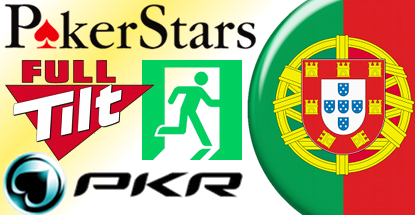 Amaya Gaming’s PokerStars brand has become the latest operator to withdraw its services from Portugal.
Amaya Gaming’s PokerStars brand has become the latest operator to withdraw its services from Portugal.
This week saw the PokerStars Partners Team issue emails to its Portuguese affiliates, instructing them that Stars’ affiliate program “will no longer accept players from Portugal until further notice.” The email warned that “all marketing materials (banners, links, etc.) and marketing efforts should cease immediately.” The decision also applies to Amaya’s Full Tilt brand.
Portugal is in the process of implementing its new online gambling regime, which came into effect on Monday, June 29. Operators interested in obtaining new Portuguese licenses are withdrawing from the market to ensure there are no complications when the government begins accepting new license applications in September.
Affiliates were told that PokerStars “fully expect to apply for a license in Portugal so that we can provide a fun, safe and competitive environment for Portuguese consumers to enjoy online poker.” Earlier this week, UK-listed bookmaker William Hill issued similar reassurances while announcing its own Portuguese withdrawal, telling affiliates it was “confident that we will have the opportunity to work together in the future.”
UK-based 3D online poker operator PKR doesn’t share this optimism, having withdrawn its real-money service from Portugal with no plans to return. A spokesman told eGaming Review that the country’s tax plans meant the market was no longer viable. PKR said “losing another segment of our loyal customer base is always a great shame,” but the accountants had done their calculations and “the numbers just don’t stack up.” PKR exited the French market for similarly taxing reasons last month.
Portugal plans to tax online poker and casino revenue at a rate of 15% to 30% depending on each operator’s annual income. Sports betting operators have it even worse, with a tax on betting turnover beginning at 8% on the first €30m in wagers, after which the rate rises to 16%. A PricewaterhouseCooper study predicted that the punitive tax plan would cause 80% of newly licensed operators to abandon the market after the first year.
